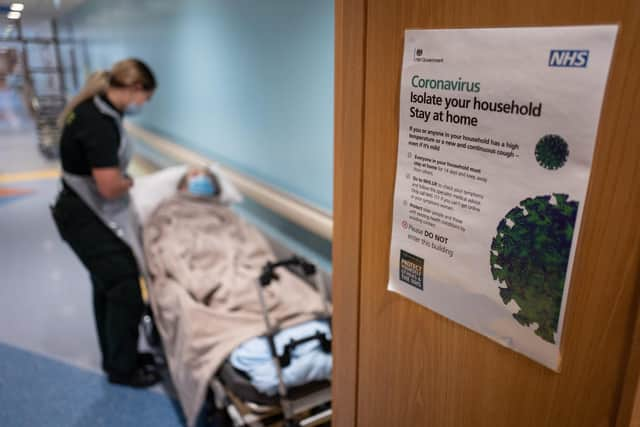New Sheffield university clinical trial aims to 'break the chain' of Covid-19 in hospitals
and live on Freeview channel 276
University College London will lead the trial, in partnership with scientists from the University of Sheffield, as part of the Government’s £20 million Covid-19 Genomics UK Consortium (COG-UK).
The pioneering study will evaluate the use of ‘real time’ viral genomic data to reduce the spread of coronavirus within hospitals.
Advertisement
Hide AdAdvertisement
Hide AdFindings will then be used to help the NHS reduce transmission of the virus, by determining whether an individual contracted Covid-19 from someone in the same hospital.


The COG-UK has established a network of rapid genome sequencing centres across the UK, which enables scientists to map the virus’ spread across the country.
Dr Thushan de Silva, from the University of Sheffield’s Department of Infection, Immunity and Cardiovascular Disease said: "We hope that our ability to analyse viral sequencing data in real-time and map the virus' spread in this unique way will not only help reduce the risk of SARS-CoV-2 within hospitals, but also consolidate the routine use of pathogen genome sequencing within NHS service delivery.
"This pioneering study will provide vital evidence on the role of rapid viral genome sequencing in helping to reduce the spread of SARS-CoV-2 within hospitals.
Advertisement
Hide AdAdvertisement
Hide Ad"Our work is all the more crucial as infection rates continue to rise again across the country."
The research is led by Professor Judith Breuer, Director of the University College London Hospital / Great Ormond Street Hospital Biomedical Research Centres funded Pathogen Genomics Unit, together with the UCL Comprehensive Clinical Trials Unit (CCTU).
Professor Breuer added: “Spread of COVID-19 infections in hospitals is now recognised to be a major problem for both healthcare workers and patients, and ‘breaking the chain’ of these transmissions is critical.
"Tried and tested procedures to minimise infection spread in hospitals are already in use, including separating COVID-19 infected patients from uninfected patients, extensive cleaning, the use of PPE, and continual hand washing.
Advertisement
Hide AdAdvertisement
Hide Ad"Despite these measures, COVID-19 transmission to patients and staff is still occurring and has sadly proven fatal. So it is essential that we try out new tools such as viral sequencing to find out why this is happening and to help reduce hospital spread."
The UK Government and National Institute of Health Research (NIHR) said the study – named the COG-UK Hospital Onset COVID-19 Infection (HOCI) trial – was of ‘Urgent Public Health’ importance.
The study, which involves over 15 hospitals linked to sequencing hubs across the UK, was developed in collaboration with Sheffield Teaching Hospitals NHS Foundation Trust, Imperial College Healthcare Trust and the Queen Elizabeth University Hospital Glasgow with the MRC-University of Glasgow Centre for Virus Research.
Each hub will analyse the COVID-19 sequences in nasal and throat samples from all known COVID-19 patients in the hospital, along with newly infected hospital patients and frontline NHS staff.
Advertisement
Hide AdAdvertisement
Hide AdThe trial will evaluate whether results from whole virus genome sequencing of all COVID-19 samples reduces the number of hospital outbreaks compared with standard methodologies.
The genomic data is likely to enable clinical teams in each hospital to see if newly infected patients have picked up the virus from a known positive COVID-19 patient within or outside the hospital and help infections be better controlled.